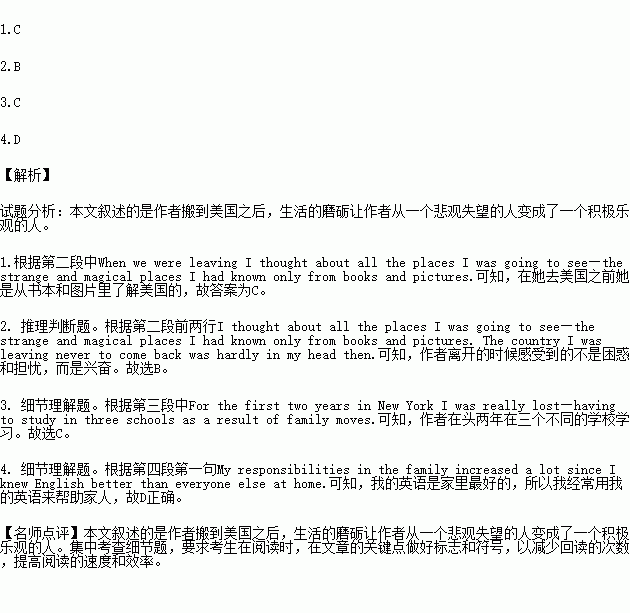题目内容
How I Turned to Be Optimistic
I began to grow up that winter night when my parents and I were returning from my aunt’s house,and my mother said that we might soon be leaving for America. We were on the bus then. I was crying, and some people on the bus were turning around to look at me.I remember that I could not bear the thought of never hearing again the radio programs for school children to which I listened every morning.
I do not remember myself crying for this reason again. In fact,I think I cried very little when I was saying goodbye to my friends and relatives. When we were leaving I thought about all the places I was going to see—the strange and magical places I had known only from books and pictures. The country I was leaving never to come
back was hardly in my head then.
The four years that followed taught me the importance of optimism, but the idea did not come to me at once. For the first two years in New York I was really lost—having to study in three schools as a result of family moves. I did not quite know what I was or what I should be. Mother remarried, and things became even more complex for me. Some time passed before my stepfather and I got used to each other. I was often sad, and saw no end to “the hard times”.
My responsibilities in the family increased a lot since I knew English better than everyone else at home. I wrote letters, filled out forms, translated at interviews with immigration officers, took my grandparents to the doctor and translated there, and even discussed telephone bills with company representatives.
From my experiences I have learned one important rule:almost all common troubles eventually go away! Something good is certain to happen in the end when you do not give up,and just wait a little!I believe that my life will turn out all right, even though it will not be that easy.
1.How did the author get to know America before she went there?
A.From her relatives.
B.From her mother.
C.From books and pictures.
D.From radio programs.
2.Upon leaving for America the author felt ________.
A.confusedB.excitedC.frightenedD.amazed
3.For the first two years in New York,the author ________.
A.often lost her way
B.did not think about her future
C.studied in three different schools
D.got on well with her stepfather
4.What can we learn about the author from Paragraph 4?
A.She worked as a translator.
B.She attended a lot of job interviews.
C.She paid telephone bills for her family.
D.She helped her family with her English.

